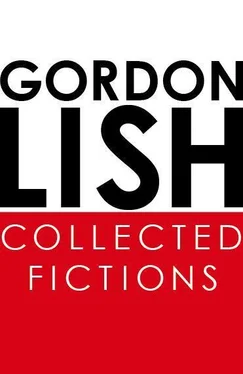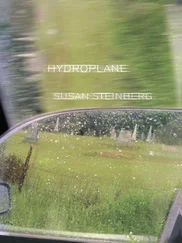At least when I am here in the city.
But when do I ever take myself thither from this city? I think never. Yet were I to, it first comes clear to me first this very instant, were I, the undersigned, to venture forth from here into field and swale, into swale and dale, then mightn't I be free, even for the littlest while, of this dreading that so vexes me?
Such an awful sentence.
"Please, sir, step to the side into the street, sir."
"Please, sir, step to the side into the street, sir."
Unless it were to have the power to pursue me into all its cruel transmutings — so that it could become, in its most pastoral use, sir, step to the side into the hollow, sir — or, in its most fanciful, the pit.
Well, it's all a matter of your making room for Eros — between Pygmalion and Narcissus.
Quotes and unquotes all around, everyone.
Yours truly, the author of this.
THE ONLY APPARENT GOOD to come of his encounter with the ravishing Chinchilla Benét was the renewal given to his residence after this person had agreed to consign her body to it for the span of a pair of nights.
He began with the bed, stripping it of its linen and of its various accessories — the mattress pad, the lamb's wool spread that lay beneath the mattress pad, the layer of ruffled foam rubber that lay beneath the lamb's wool spread. The linen and mattress pad he took to his washing machine, adding a dose of his most astringent detergent. The lamb's wool spread he fetched to the dry cleaner, tarrying while the deed was done, all the more promptly to see to the return of this object to his premises so that the great labor before him might be, without undue delay, gotten on with.
The layer of ruffled foam rubber — this he discarded at the service elevator, thereafter telephoning a bedding company for overnight delivery of a replacement.
He poured bleach into the commode and allowed it to stand for the time it took for him to scrub — scour, could we say? — the exterior surfaces of the porcelain.
He thereupon activated the flushometer in order that the way be cleared for a serious exertion on the interior, and then, this task brought to an end, put himself to sleep on the floor of the facility, waking the next day to the bedding company's proof of its promise of reliability, or was it its sympathy that it had warranted?
He could not get his mind to produce the answer.
The only product in it was the yes of the ravishing Chinchilla Benét.
She had said yes to him, yes to him, yes — but presently demonstrated to him the hopelessness in all things uttered once she had lain herself out alongside him in his very soft, very thoughtful, very complicated bed.
"Is there something wrong?" said he. "I'll fix whatever is wrong," said he.
"Oh no, thank you — it is all wonderfully lovely, thank you," said the ravishing Chinchilla Benét, offering the bosom of her pillow — he had retrieved from storage for her his most treasured, his featheriest, example of the sort — a reassuring pat of the hand, a gesture incomparably prophetic of the one the ravishing Chinchilla Benét in due course performed on the elbow of his arm when bidding him adieu at the delightful moment of her departure.
"Was there something wrong?" said he. "I would have fixed whatever might have been wrong," said he.
"Oh no, thank you — it is all wonderfully lovely, thank you," said the ravishing Chinchilla Benét, thence — presto! — with no further ado, exhibiting herself as gone from him, and therefore from his habitation, forever.
Whereupon he, our unnamed tenant, not one whit to his surprise, found himself discovering in himself a certain sense of — ah, the word is triumph, isn't it? — and never a gladness more grateful and intemperate.
AT LEAST THIRTEEN WAYS OF LOOKING AT LOOK
LISTEN, YOU ARE LOOKING AT SOMEBODY who just can't wait to look derived. It scares the spunk out of me for me to think they'll come along and look at my writing and say, "Hey, who sent this clown? Where'd he come from? Uh-oh, this goofball, he's not some kind of vagrant Johnny-come-lately, is he?"
Please, I know all about Bloom and that stuff — and, believe me, I'm not saying it's not terrific stuff, Bloom's stuff. But I'm telling you, the one thing you are sitting there looking at when you sit and look at me is somebody who does not want to look like somebody who is exclusively responsible for himself.
Talk about anxiety — as far as I myself am concerned, Bloom did not know what he was talking about when the man was talking about anxiety.
He ever hear of the Anxiety of the Appearance of You Being the Sole Culpable Party in Sight?
Which is why I always knock myself out looking for epigraphs as alibis.
I figure if I can stand my writing right in back of the right writer by citing the right epigraph right up front in front of my writing before anybody has had himself a chance to look at my writing, I can maybe sort of look as if I am sort of maybe guilty, all right — conceded, conceded! — but not without virtue of a certain glamorous affiliation. You know — the forgivably bastard son of, a traceably impoverished relation to. As in, you know, all honor to Bloom, you bet — but, honest, I'm always looking to look as if I am as influenced as anybody can transumptively get. Which is what led me to looking very closely at Wallace Stevens a little bit ago — epigraph-hunting for all I was worth.
Well, I had the notion it would look pretty wonderful on me for me to look as if I had spent some deep time looking deep into the depths of Wallace Stevens.
(Which can have the effect of getting you to believe Wallace Stevens spent some deep time looking deeply into you, you know?)
So when the poems had me stumped (except for a couple or three that probably had me no less stumped but that, anyhow, knocked me flat), I started looking all around inside of Stevens' daughter's selection of Stevens' letters — and, boy, didn't I find there all the wild provocation for wild postures of derivation a fellow as underived as myself could require!
Get this.
The man's wife was named Elsie.
Okay, the fifth-most of the most romantic sensations of my childhood (the first-most I felt in the vicinity of myself, the second-most in the ditto of my mother, the third-most in that of one of my grammar-school teachers, the fourth-most while sitting on the curb gazing at — I admit it, I admit it! — an American coin) was aroused by the name Elsie when I found out it was the name Elsie which was the name of the woman up the block, which woman — O Elsie, Elsie, Elsie! — was my playmate Harvey Weidenfeld's — oh, wow! — mother.
Okay, so now I find out Stevens' wife, his daughter Holly's mother, that she also was an Elsie.
Okay, what next do I find but that that where Stevens and his Elsie first lived here in the city here was where their landlord had Stevens' Elsie model for him so that the landlord — otherwise, in the official manifestation of himself, a sculptor — could enter the result in a U.S. Mint competition for the face that would newly decorate the U.S. Mint's newly-to-be-minted ten-cent piece, which is, you know, remember the coin? Oh, you must, you must!
The dime.
Get this.
It wins.
He wins.
The Stevenses' landlord wins.
It's therefore Elsie Stevens' face that is there on one side of the ten-cent piece that is driving me — when I am eight and nine and ten — crazy with feelings.
Plus which, it's such a swell face, or that version of it is, that the U.S. Mint decides to let it also go be the face that goes on the fifty-cent piece, too.
The half dollar.
So that that face — you get it, you get it? — the face a million years ago my insides were getting themselves all swimmy over — turns out to have been the face of — well, of my derived-from's missus.
Читать дальше











